MCL 2023 invited State University of Zanzibar students to find sustainable and digitally innovative solutions for urban planning challenges in coastal communities in Zanzibar. Sit back and read the stories below to get insights of the experiences throughout the challenge!
Story 1: Introduction & kick-off
Imagine stepping into a new way of learning……… “Multi-Competence Learning 2.0", or MCL 2.0. In fact, it’s like setting sail on a ship of exciting ideas! Our journey began with a goal to make learning fair for everyone, especially when it comes to coastal resources. Think of it as a large puzzle with different pieces. Thus, we wanted to solve a large puzzle entitled “Inequalities to coastal resources” where we wanted to focus on challenges like flooding, coral destruction, and other challenges that face our coastal communities. Each problem was like a wave in the ocean, and we wanted to ride these waves and find solutions.
This story tells everything about our journey, what we learned,the fun and obstacles we encountered. We were a team of dreamers, each bringing something special to the table. Imagine us as a team of friends; Deep Sea Explorers, Brainstormers, Sustainable Savers, Goal Diggers, and Dream High Pioneers. Together with our teachers and mentors, we wanted to make sure that everyone has the same chance to learn and grow. Our journey was a bit like a compass guiding us in the right direction. We hope you enjoy our journey into the world of learning, where everyone gets to be part of the adventure!
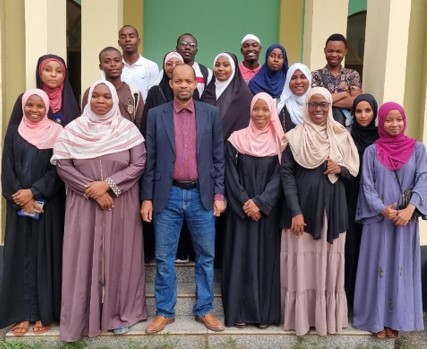
Group photo of SUZA MCL 2023 mentors and staff members.
Starting our learning adventure with MCL 2.0
We kicked off our exciting journey into the MCL 2.0 Program. Imagine a big gathering where this new way of learning was introduced to our students. We were so eager and thrilled about what was to happen ahead. It was surely a grand opening ceremony with all the excitement and anticipation where the project coordinator Dr. Abubakari Diwani and our project administrator Dr. Mary M. Khatib as well as other internal experts introduced to us the umbrella challenge for this year, the learning methods, tools, team working ethics as well as the stages to be followed throughout a whole period of eight weeks of our adventure. It was like the beginning of a thrilling book, where you turn the first page and are eager to see what happens next.
Milangali Yahya Kimu, a participant of MCL 2.0 says that,
“It is surely the first time that I am participating in the platform like this and I am looking forward to see how it works, but from the introduction that has been given by the coordinators, the program sounds great for sure”.
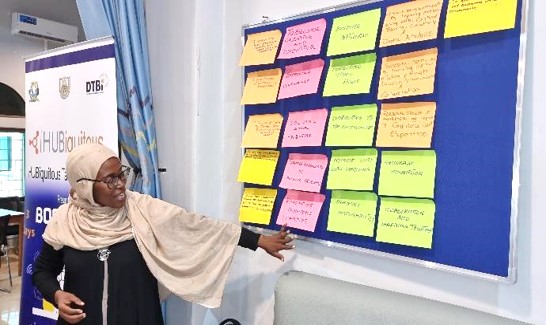
Dr. Mary M. Khatib introducing the MCL umbrella challenge.
Story 2: Assembling the dream teams & formulation of Actionable Problems
The teams were formulated based on the multidisciplinary approach since we had students from diverse disciplines of studies including Environmental students, Agricultural, IT as well as Computer Science students. We gathered all participants and made teams. It’s like having a bunch of friends with different talents, and we wanted each team to have a mix of these talents.
So, from a group of 22 students, five teams were formulated. Two teams with five members and three teams with 4 members, each with her or his specific role in the team. An exciting part was that time where every team had to come up with its name. The formulated team names were Brainstormers, Deep Sea Explorers, Goal Diggers, Sustainable Savers, and Dream High Pioneers. All team names reflected the umbrella challenge, exploring into the heart of coastal resources inequality and unearthing solutions that could elevate the lives of the local community people living at Nungwi coastal village as well as Zanzibar in general.
That’s how our teams were formulated, a perfect mix of skills and talents to make our dream project come alive!
From challenge to sub-challenges (Actionable Problems)
In this chapter we elaborate on the process of formulating actionable sub-challenges or problems within the broader umbrella challenge of coastal resource inequality. Using the umbrella challenge system map, the students were able to narrow down the umbrella challenge into smaller manageable actionable problems such as Coral Destruction, Flooding, Coastal Erosion, Coastal Waste, and illegal fishing. At first each team had developed many different sub-challenges using a mapping method by brainstorming and listing different problems, but in the end each team came up with only a single manageable problem. These sub-challenges/actionable problems became our compass, guiding us throughout the project.
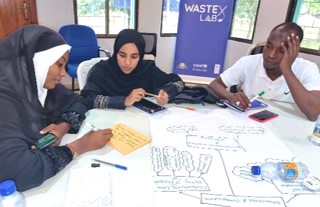
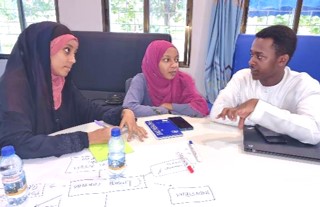
MCL student groups brainstorming Actionable Problems they could start solving during the campaign.
Story 3: Field study adventures & meeting with stakeholders
Our case study field area was Nungwi coastal village. Nungwi is a large village located in the Northern part of the Island of Zanzibar with a rapidly increasing population due to the growth of tourist activities. Thus, we vividly describe the experiences and interactions we had with the local society, gaining insights into their realities. It was during this phase that we truly understood the importance of our project and the impact it could have on real lives. The students had an opportunity to validate their actionable problems as well as collecting data about their formulated actionable problems.
First, getting there was like a fun road trip with friends. We traveled together with our mentors and project experts in a big car, chatting and sharing ideas. When we arrived at the beach, it was like stepping into a new world. A descent smell of the ocean, the sound of waves crashing. It was exciting and we couldn’t wait to explore and learn.
Our mission was to collect important information and data to understand our actionable problems in a better way. The students used various tools such as GPS, Maps, and Drones to collect important data related to their formulated actionable problems. Students also had an opportunity to interact with local community people as they asked them different questions about their experiences, perception and challenges. They shared stories and insights, helping us understand the bigger picture. Their words were like pieces of a puzzle helping us see the whole picture more clearly. By using those tools and talking to the locals, we gathered lots of information and data ranging from qualitative to quantitative that was put into graphs and charts.
Munira Rashid Kombo, one of the participants of MCL 2.0 postulates that,
“Visiting this area and having direct dialogue with the community people has helped us to gain a lot of information related to illegal fishing that will surely guide us in the whole process of formulating a suitable solution”.
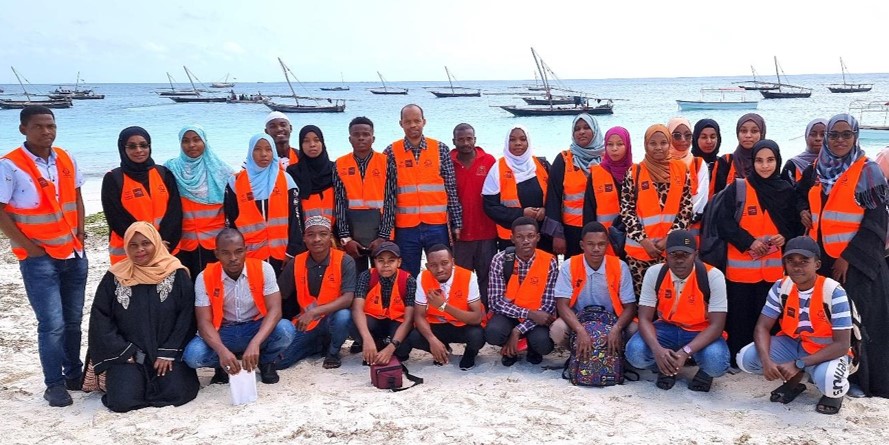
Group photo of the SUZA students participating in the MCL campaign 2023, on the Nungwi beaches.
Meeting with Stakeholders
Student teams had an opportunity to conduct meetings with various stakeholders relevant to their actionable problems. These included, Tanzania Meteorological Agency (TMA), Zanzibar Fisheries and Research Institute (ZAFIRI), Zanzibar Environmental Authority (ZEMA) and Marine Conservation Authority. In these meetings, students had an opportunity to ask many questions regarding their actionable problems and they acquired banks of data that helped them so much as they sailed further in the procedure of developing solutions. In our visit to TMA students were also taught how to conduct the analysis of various weather and climatic components such as temperature, rainfall as well as sea level rise.
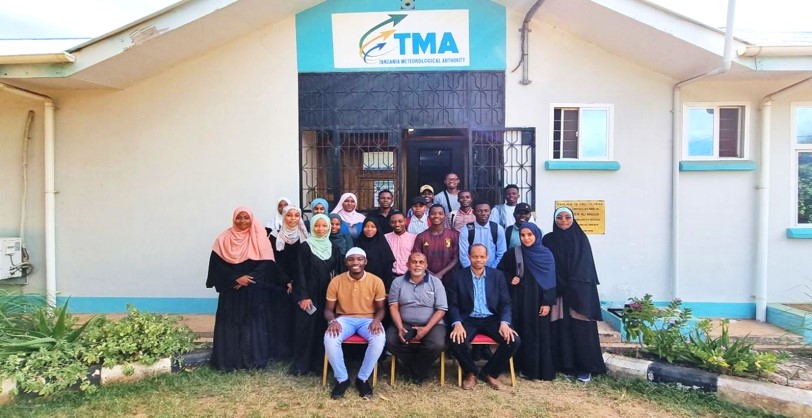
MCL students and mentors posing in front of the Tanzania Meteorological Agency building, togther with TMA experts.
Story 4: Crafting solutions for a better tomorrow & dissemination efforts
Imagine creating tools that could help save the coastal environment, and that’s exactly what we did! We wanted to tackle the problems of weather changes, coral health, waste management, illegal fishing as well as erosion.
In tackling the problem of flooding that is caused by changing climate, the Goal Diggers came up with a mobile App that predicts weather conditions. This app also warns people about extreme weather, helping them be safe and prepared by giving them notification about any changes in weather conditions. It predicts various weather components including temperature, rainfall/precipitation, humidity, as well as wind speed and wind direction.
Next, the Sustainable Savers created a smart trash bin which provides notification to the waste management authorities when the trash bin is nearly full so as to take early and quick procedures to off-load the waste materials from the trash bins. It also provides notification in the form of red color to the local people to mark that the dustbin is full. This is supported by a web map that shows the location and distribution of the dustbins in the village, as well as showing the distance from one’s location to the dustbin point.
Dissemination Efforts and Sharing of Ideas
On the final day of the eight weeks, we had an exciting event. In fact, It was like a friendly contest where each team was showcasing their idea in front of the judges and the guest of honor.Out of five teams, only three teams were to be announced as official winners and were to be rewarded with presents by the guest of honor. After the presentations, finally the judge announced the Sustainable savers as the first winners, Goal diggers took the second position and the third runners were the Brainstormers.
Even though only three teams were announced as winners, all teams were already winners because they did their very best to make it to the final day. We all celebrated together, cheered for one another, and felt like a big happy family united in our journey to make a difference.
As the day ended, we said goodbye to each other knowing that this contest was just the beginning. We left with smiles, ready for what’s next, and excited to continue our adventure with new found friends. It was surely the beginning of something amazing, a journey of teamwork and making the world a better place.
“This program has been quite transformative, though it was challenging in the beginning since we were being exposed to a new way of learning. But in fact I wish we had more time to continue with the program and I would suggest such a mode of learning to be adapted by our university” - Hafidh Badru, MCL 2.0 participant/student
Story 5: Mentors and mentorship experiences
A selected core mentor was an MCL 1.0 alumni, so he had enough experience with the program and he was in a good position to guide the students regarding the activities of the program. Together with the core mentor, we also had other three side mentors who were visiting regularly to help guide the students throughout the program.
Our core mentor had the following to say regarding his experience in MCL and how the program has transformed him both personally and academically,
“My journey into mentorship within MCL 2.0 was not just a role but a natural progression rooted in my initial participation in the program. Having been part of the first MCL, I found myself in a better position to contribute as a mentor. This position allowed me to share my experiences and skills to help guide participants and actively contribute to their growth. Beyond mentorship, MCL has also contributed much to my personal success in the “Giving story” competition that was run all over the country.
The skills gained through MCL played an important role in securing a triumph in the competition as I won the fourth place and I was rewarded with 500 USDs. The ability to craft narratives, address challenges effectively, and do presentations with confidence were all attributes cultivated through the mentorship role. In essence, my mentorship experience was not just about guiding others but a journey of personal and collective achievement, where skills acquired in MCL propelled me to success in external endeavors”. - Yahya Badru, MCL2.0 Core mentor